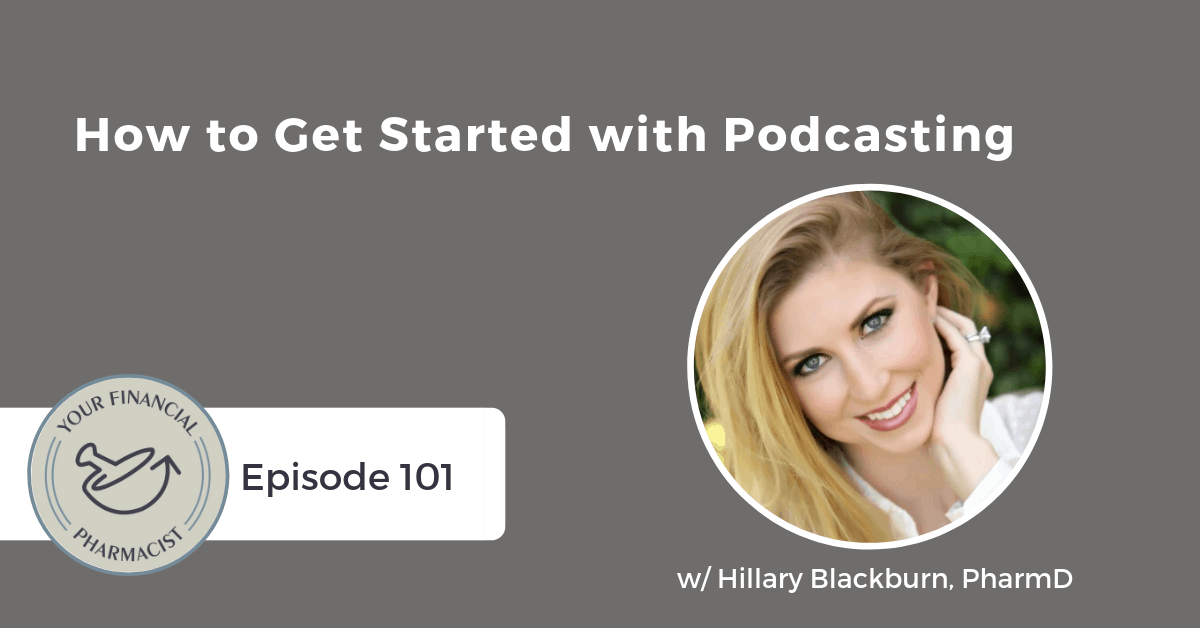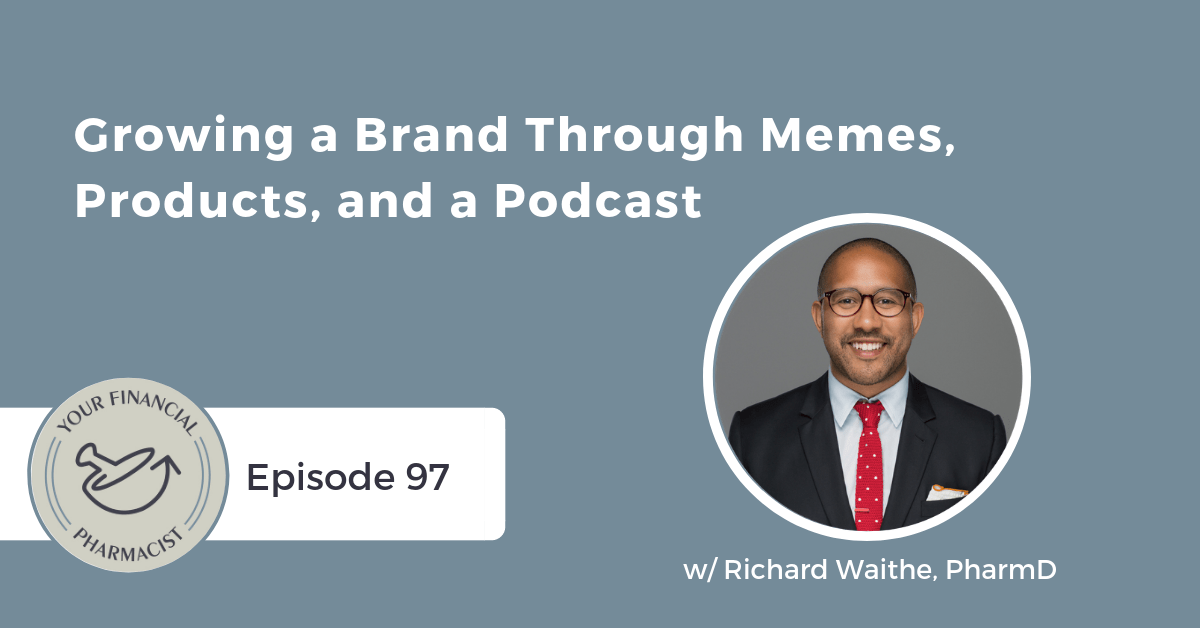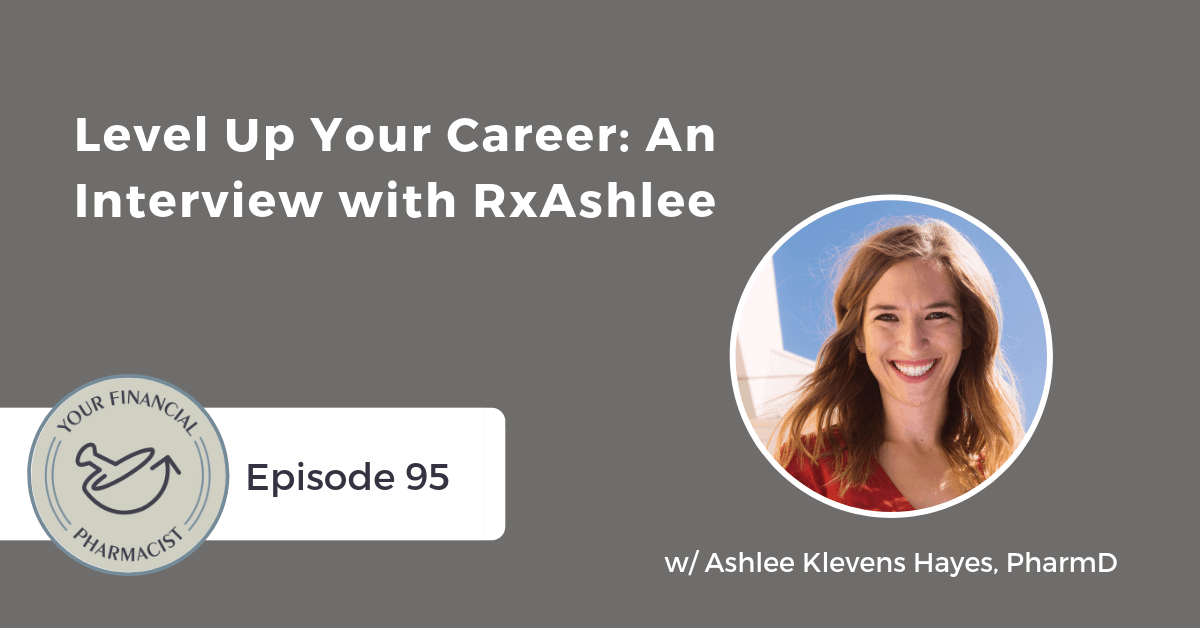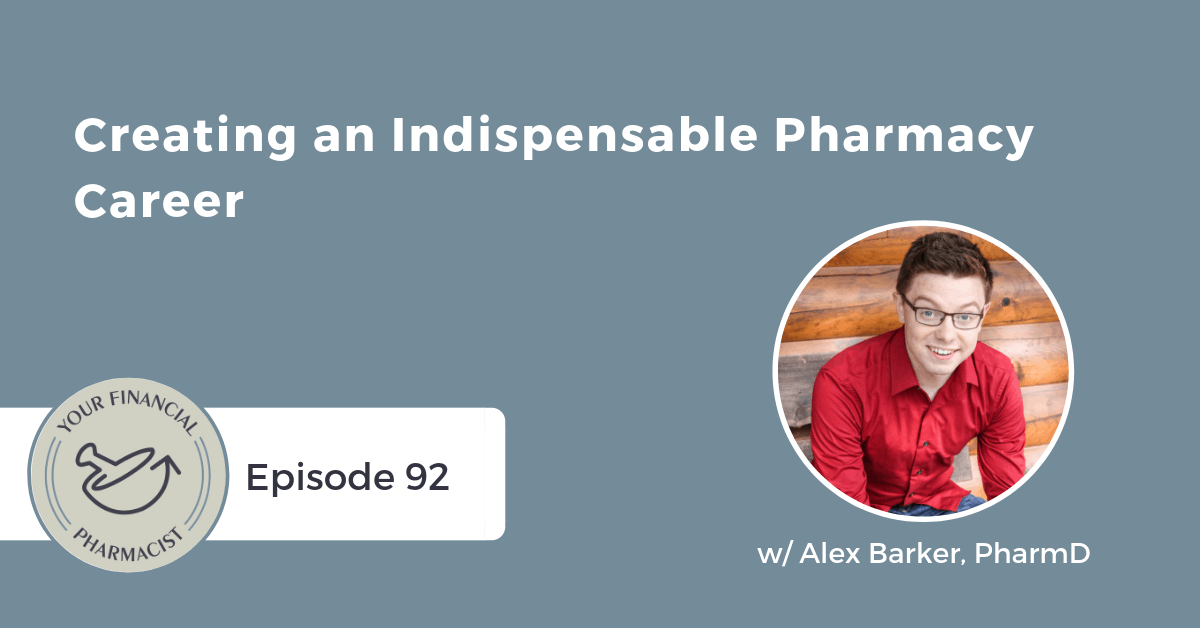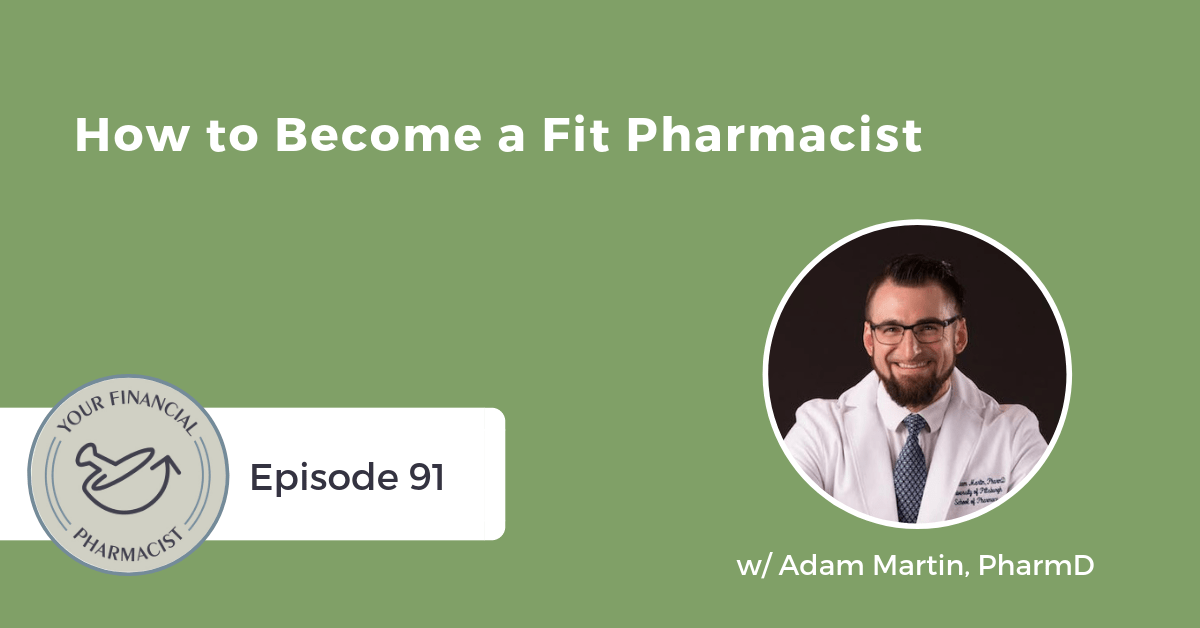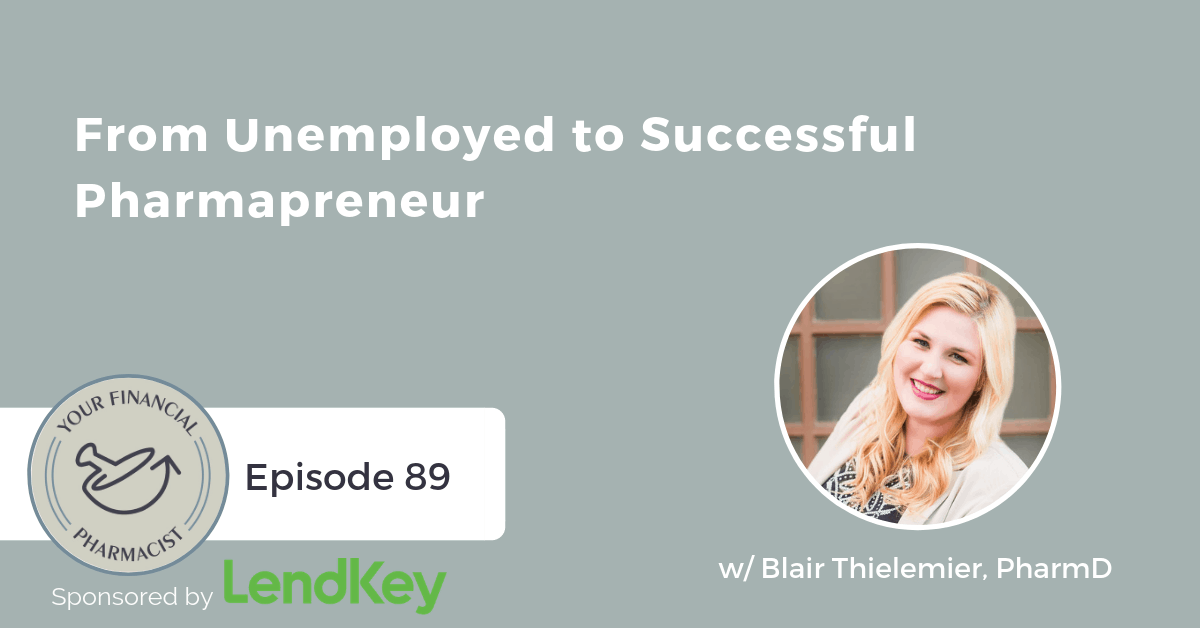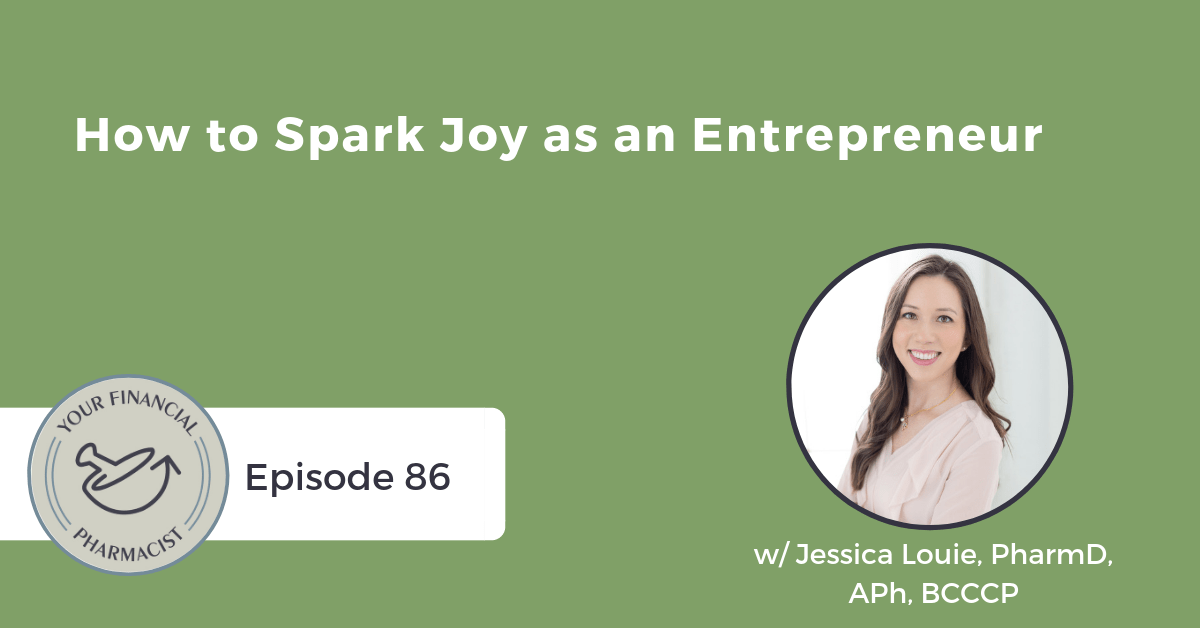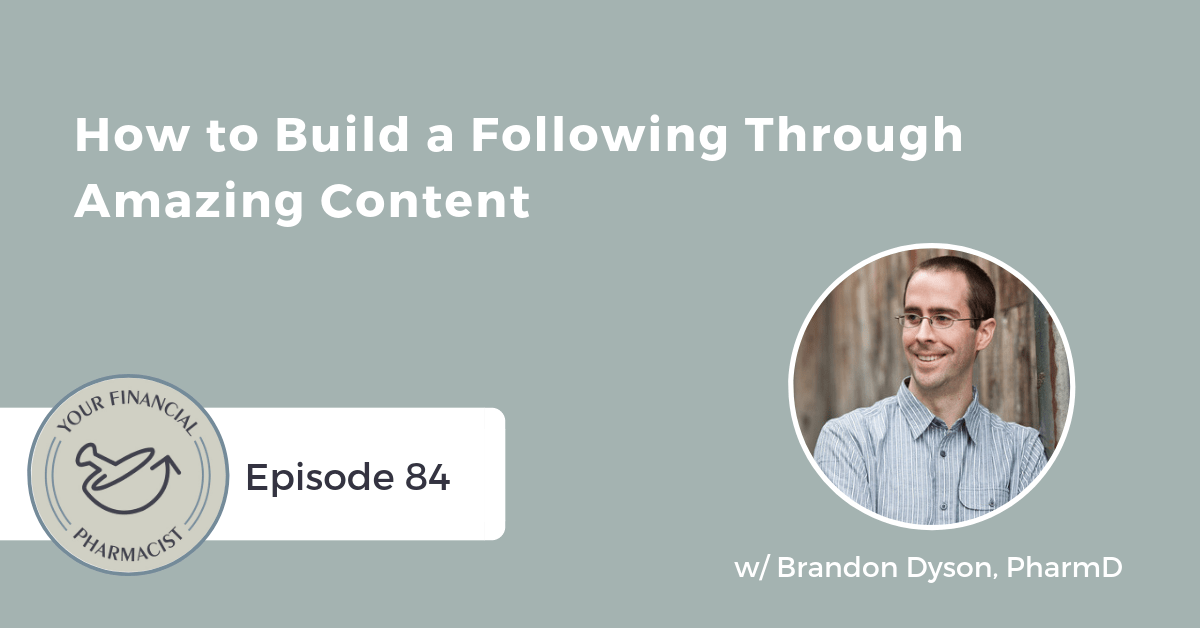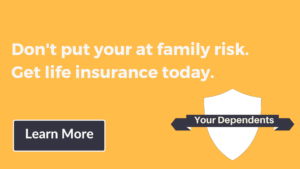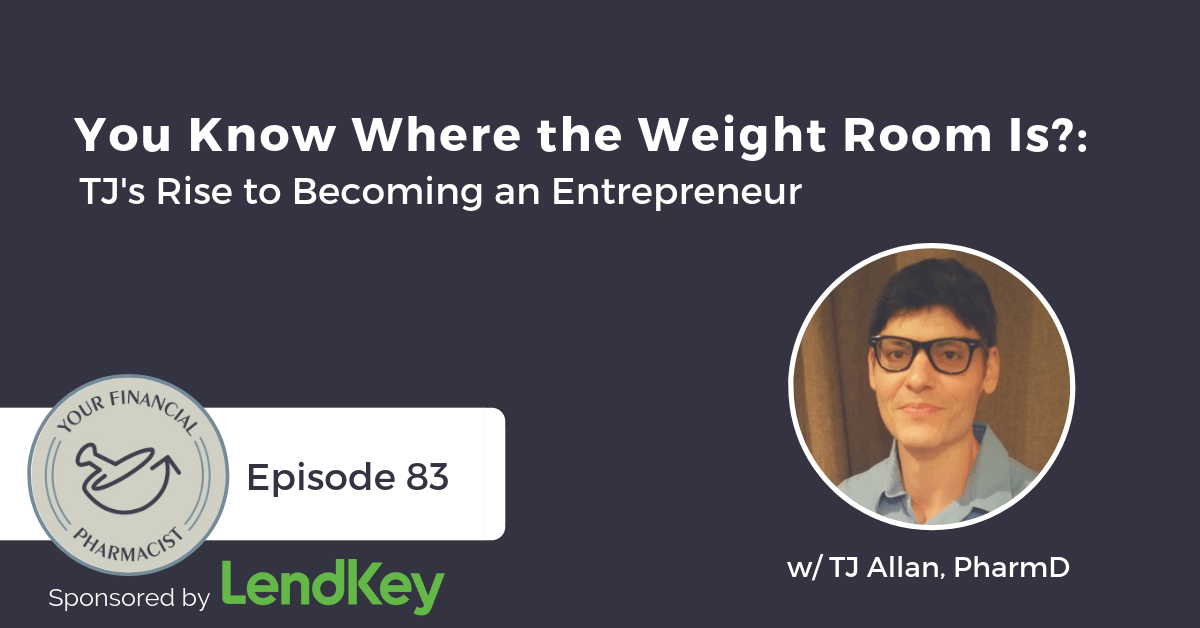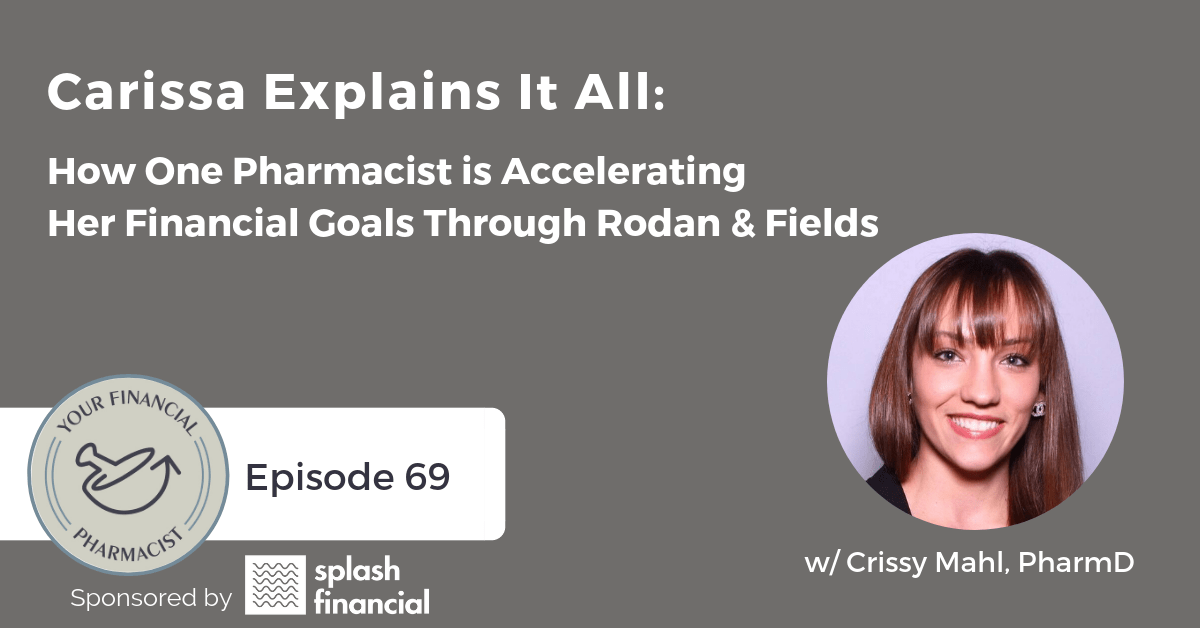How to Get Started with Podcasting
Dr. Hillary Blackburn joins Tim Church on this week’s episode to talk about her unique pharmacy career at Dispensary of Hope, her side hustles, and how she started the Talk to Your Pharmacist Podcast.
Summary
Dr. Hillary Blackburn is a clinical pharmacist, Director of Pharmaceutical Services at Dispensary of Hope, creator and host of the Talk to Your Pharmacist podcast and the Founder and CEO of the Natural Products Resource Center (NPRC). She joins the YFP podcast to speak about her unique pharmacy career and side hustles.
Hillary grew up in Mississippi and graduated from the University of Mississippi. She always thought she would end up in medical school, but after being on clinical rotations she saw how broad of a career pharmacists can have.
Hillary has worked in several capacities as a pharmacist but loves the role she holds as the Director of Pharmaceutical Services at Dispensary of Hope. Dispensary of Hope is a charitable medication distributor that distributes medication to uninsured people in 31 states and over 160 pharmacies and clinics. Her day-to-day schedule at work varies, but you can find her attending meetings, answering emails, planning, and presenting on current pharmacy trends often. She explains that her job is a blend of managed care, management, public health and mission.
After being in Nashville for a year and meeting her husband, who is also very entrepreneurial, Hillary got that entrepreneurial itch, too. She loves to listen to and read content about pharmacy and pharmacy trends and decided to start the Talk to Your Pharmacist Podcast in Spring 2017. She sought guidance in her network and worked with two people in Nashville to learn how to start a podcast. Now, Hillary does everything from start to finish, including identifying a guest, researching the guest and topic, scheduling, recording, and editing. She has since been able to monetize the podcast through sponsorships from companies that have organically found her. She was first approached for sponsorship after releasing 40 episodes in Talk to Your Pharmacist Podcast’s first year. Hillary only supports and suggests brands that she’s tried and believes in.
Hillary is also the founder and CEO of the Natural Products Resource Center (NPRC). Additionally, she also has created Residency Bootcamp evergreen webinars which provide on-demand training to coach people through the residency process. Hillary also moonlights for a retail pharmacy chain. Her extra money is going to a lot of saving, travel, and planning for a family.
Hillary really enjoys her job at Dispensary of Hope and doesn’t find it to be stressful. She’s able to find time to balance her side hustles with her life by prioritizing her health and being driven by passion.
Mentioned on the Show
- Refinance Student Loans
- Talk to Your Pharmacist Podcast
- APhA
- Dispensary of Hope
- Entrepreneurs on Fire Podcast w/ John Lee Dumas
- How I Built This Podcast w/ Guy Raz
- Ted Talks
- Masters of Scale w/ Reid Hoffman
- The Science of Success Podcast w/ Matthew Bodnar
- Health:Further
- Talk to Your Pharmacist Instagram
- Residency Bootcamp
- The ONE Thing: The Surprisingly Simple Truth Behind Extraordinary Beliefs by Gary Keller and Jay Papasan
- Tony Robbins
- Gary Vaynerchuk
- The 7 Habits of Highly Effective People: Powerful Lessons in Personal Change by Stephen R. Covey
- Audible
- Good to Great: Why Some Companies Make the Leap and Others Don’t by Jim Collins
- EntreLeadership Podcast w/ Dave Ramsey
- Outliers: The Story of Success by Malcolm Gladwell
- Crush It! Why NOW Is the Time to Cash In on Your Passion by Gary Vaynerchuk
- Never Split the Difference: Negotiating As If Your Life Depended On It by Chris Voss and Tahl Raz
- Leading Change by John P. Kotter
- Pharmacy Advisory Group
- Talk to Your Pharmacist Facebook
- Hillary Blackburn Twitter
- Hillary Blackburn LinkedIn
Episode Transcript
Tim Church: Hillary, thank you so much for taking the time to come on the show and for being part of this side hustle edition.
Hillary Blackburn: Awesome, thanks, Tim. It’s an honor to be a guest.
Tim Church: Yeah, we’re reciprocating, right? Since you gave me the opportunity last year. That was really cool to be a part of your show.
Hillary Blackburn: Absolutely. Yeah, I love getting to share with other pharmacy leaders and even getting to meet them in person. Tim Ulbrich was just down in Nashville a few weeks ago and had the pleasure of getting to connect with him as well. So always fun to do some collaborations.
Tim Church: Yeah, when we met last year in Nashville at the APhA annual meeting, it was pretty easy to tell that you’re somebody who’s not only passionate about our profession but also entrepreneurship. So it’s always fun to get a chance to talk with you.
Hillary Blackburn: Yeah, yes. It’s fun to be with other like-minded pharmacists for sure.
Tim Church: So can you talk a little bit about your career path as a pharmacist?
Hillary Blackburn: Sure. So I’m Hillary Blackburn, currently director of pharmaceutical services at Dispensary of Hope, the creator and host of the Talk to Your Pharmacist podcast and the founder and CEO of the Natural Products Resource Center. So clinically trained and have been practicing for the past eight years in a variety of settings. So my career has taken a few, you know, unexpected paths but ultimately, have led me to where I am today. So you know, after attending pharmacy school at the University of Mississippi, I definitely selected rotations to get a very broad experience in clinical rotations but even served as an intern during two summers with the Health Resources and Services Administration’s Office of Pharmacy Affairs in Washington, D.C. Even attended APhA Summer Leadership Institute during one of those summers, which was an excellent experience if any students get the chance to go. And some of you may know that HRSA, or the Office of Pharmacy Affairs oversees the 340b program, which is a program to support the hospitals and clinics across the country who are serving the safety net population. And this was a really unique opportunity because I was able to explore more of that public health standpoint and how to operationalize a national program. And growing up in the Mississippi delta, I was very familiar with some of the lower income population and just had a passion to give back and serve in that way. So after graduating from pharmacy school, I completed my PGY1 residency at the University of Mississippi Medical Center and continued on with that clinical care of being in the ER and ICU, rounding with the internal medicine teams, even having experiences in the ambulatory setting. And you know, after residency, I moved to Nashville and thought I was going to continue on in that path with hospital and really clinical pharmacy but realized that I wanted to change that a little bit and actually worked in the independent pharmacy setting for a family friend and then spent some time working for a health plan, learned all about the prior authorization process, you know, refined my formulary management development skills, and then worked at a specialty mail-order pharmacy. So all of those different experiences really have kind of culminated into where I am now, which is full-time at the Dispensary of Hope, which is a charitable medication distributor, for those of you who aren’t familiar. So since 2012, Dispensary of Hope, which is based in Nashville, has assembled a collaborative of most of the largest drug manufacturers in the pharmaceutical space and most of the largest health systems that are serving the uninsured. And so what we do is we partner with these pharmaceutical companies who donate medicine to us as a wholesale distributor, and then we distribute it to clinics, FUHCs, charitable pharmacies and hospital outpatient pharmacies across the country, serving over 160 pharmacies and clinics in about 31 states now.
Tim Church: Wow.
Hillary Blackburn: So it’s really grown a lot, and this was a role that didn’t exist before I started in this position. And so I’ve been able to really create this as my own, you know, unique role and have really expanded those responsibilities. So not only am I still maintaining our formulary, which I started doing as a volunteer when I had some of my other roles, but now I’m consulting with pharmacy leaders across the country, sharing expertise on affordable medication access, helping with any strategy development for implementing programs to address gaps in pharmaceutical care, lead our research and create tools for successful program implementation and help maintain partnerships with some of our external partners such as colleges of pharmacy. So it definitely keeps me busy, but I still have some time and some passions for some other projects.
Tim Church: So what’s your day-to-day look like at the Dispensary of Hope?
Hillary Blackburn: Yeah, well, it varies, which I thoroughly enjoy. So because we’re also a distributor, we do not see patients, which I do miss that aspect of pharmacy practice. There’s definitely a value of being able to see that direct impact on a patient’s life that you’re helping and improving. But day-to-day, it varies anywhere from, you know, attending meetings with the rest of our team. We do not have any other pharmacists on staff. I do have pharmacy students that are on rotation with me. So we’re really bringing that clinical expertise to the organization. And so you know, sometimes I’ll be doing a lot of emails and having to maintain that professional persona and thinking about strategic things like that, planning presentations. I’ll be going over to South Carolina to talk with the South Carolina SHP or ASHP division, talking about healthcare is getting disrupted, is pharmacy ready? So excited to be traveling and giving some presentations about current pharmacy trends, which is a lot of what I do with my podcast, Talk to Your Pharmacist. So it definitely varies, but I usually have a pretty full plate, which keeps me busy. And I enjoy having students to share that kind of mixture of a little bit of managed care management, public health and mission.
Tim Church: That is just really interesting just because obviously, it’s not the most traditional type of pharmacy position. But what I find very fascinating is just the role that you’re playing and how far the reach is. You mentioned 31 states, multiple facilities that you’re helping facilitate the distribution. I just think that’s amazing.
Hillary Blackburn: It is. And you know, being able to visit the pharmacists and pharmacy technicians that are actually doing the work and taking care of patients is probably my favorite part of my role is when I get the opportunity to go out in the field and learn from them too because then I’m able to bring it back and put together resources and share those best practices across our network of pharmacies and clinics.
Tim Church: That’s really cool. Well Hillary, in our profession, there is a lot of negativity with pharmacists’ job satisfaction, just the role in general. What do you like about being a pharmacist and about your job in general?
Hillary Blackburn: That’s a great question. And you know, I’ll tell you what. When I was planning to go to college, I thought I was going into med school. You know, my parents actually encouraged me to apply to Ole Miss’ early entry pharmacy program. And you know, all along, I kind of thought that I was still going to go to med school. But it wasn’t really until my fourth year of pharmacy, getting to do all of the awesome rotations and see the great diversity that pharmacists have opportunities for, and I mean, it’s just blown up even since I was in school. But that was really the exciting — where my passion just really kind of took off about all of the different opportunities: pharmacists being in the pharmaceutical industry or playing integral roles all throughout the hospital setting and then, you know, now we’re really seeing pharmacists heavily embedded in physician practices and finally being recognized with some provider status designations in certain states. So I think we’re going to start to see that happen in different states, you know, as we’re moving from fee-for-service to value-based care, it’s going to be so important for pharmacists to demonstrate the value that we bring to the healthcare team. So I think that’s something that we all need to keep in mind.
Tim Church: Yeah, I definitely agree. So you’re doing amazing things at the Dispensary of Hope and reaching a lot of people. But at what point did you say, ‘You know what, I have this entrepreneurial itch, and I really want to start a business or just do something in addition to my full-time job?’
Hillary Blackburn: Yeah. You know, I have always been a multi — or I guess just very disciplined about time management. Growing up, I played just about every sport. Being from a small town was great in that I had a lot of opportunities, so I’ve always been really regimented with my schedule. And so staying busy is something that I enjoy. And so after pharmacy school and then residency and then being in Nashville, after I’d been in Nashville for about a year or two, and then met my husband, who’s very entrepreneurial, Nashville is just such a great place for entrepreneurism and innovation in healthcare. And you know, starting this podcast was something that, you know, I had been listening to podcasts about entrepreneurship, I loved “Entrepreneur on Fire,” “How I Built This,” “TED Talks,” there’s “Masters of Scale” is one by Reed Hoffman, the founder of LinkedIn. I had been listening to all of these and thought, wow, I’d love to be able to consume content about pharmacy and all of the different trends and things going on there, so much is happening, and it’s hard to keep up with everything. And so that’s really in the spring of 2017 was kind of when I had this vision, and I’m such a doer, you know, once I get something in my head, I’m like, OK, I’ve got to do it. And so you know, it was created really for pharmacists and student pharmacists and others who want to hear from industry leaders about their leadership stories and perspectives on healthcare topics. And it’s just been kind of a fun passion that has turned into, you know, a revenue source. So it’s always great whenever you can fund your passions. So it’s been a really fun journey.
Tim Church: Definitely. So what are the ways you’re monetizing it right now?
Hillary Blackburn: Yeah, so you know, I really had no expectations on the podcast. I thought, you know, I’m just going to start doing it, and see where it goes. You know, of course some goals would have been like, oh, I’d love to get a sponsor or do affiliate marketing or maybe doing a podcast will lead me to get some paid speaking or consulting engagements, which is really I put it all under the umbrella of the Pharmacy Advisory Group, so I could do advising for companies and things like that. But actually, the way that I’ve monetizing it is some of these companies have just organically come to me. So you know, I’ve just stuck with it, with I think I’ve produced — let’s see — over 40 episodes in the first year. So I was almost releasing one a week, which I have been doing that now because I have a sponsorship commitment. But after doing it almost a year, I was approached by Theraworks Relief, which is an over-the-counter muscle cramp reliever, you know, and have been working with them for since August of 2018. And I don’t support any — or I’m not going to sponsor any products that I don’t fully support and believe in. And so after learning about the company, getting a sample of it, you know, I mean, I went through all of that. And I can honestly say that I use it and have got family members who use it. So for me, I don’t necessarily get a lot of cramps as typically, you might when you get older, have some electrolyte things, Restless Leg, things like that. But from like workouts and things, I guess I tend to use it for that. But I’ve got family members using it. And then secondly, another company, Rx Destroyer, is the newest sponsor that we are partnering with. And it’s a really neat company as well. And they’re a chemical drug destruction solution. So basically, it inactivates medications using activated charcoal. They’ve got, you know, a unique mechanism there. But it’s a drug disposal solution for individuals, you know, we’ve got kind of the opioid crisis right now and people don’t want to have all of these unwanted meds at home. So they can get that product at Walgreens or for businesses. So long-term care facilities, the other facilities who have to be responsible for destruction of medications. They can use this Rx Destroyer, and it helps protect our water supply, they’re compliant, so it’s been really fun that those two companies have been able to essentially seek me out and have been — I’ve really enjoyed being able to work with them and, you know, share about their great products with the pharmacy community.
Tim Church: Yeah. And I think that’s really cool, like when you fully believe in products or services, it’s pretty easy to promote those. And that’s similar to what we do on this podcast as well. But making sure that you vet those companies and services that basically, you’re going to trust them yourselves or with your family members, promoting them or encouraging them to use those. So I think that’s one thing that’s really key because unfortunately, there can be a dark side. I know a number of podcasts or just webistes, and they’ll basically promote anything, you know, just based on the traffic that it gets, so I think that’s a really cool process in the way that you took that approach.
Hillary Blackburn: Yeah, I definitely don’t want to promote anything that I don’t fully believe in, so.
Tim Church: So talk about some of the struggles, the challenges, just getting a podcast up and running because — now, I can’t take credit because the other Tims were the ones that really got this one going from the ground floor — but obviously, there’s a lot involved. So talk a little bit about the beginning stages, what was tough for you? What were some of the challenges?
Hillary Blackburn: Oh, there was a lot of tough things because it’s just like anything when you haven’t done it before, you’re like, well, how do I take the next step? So I was really lucky in getting to connect with two other guys here in Nashville who were really generous about sharing their stories. Matt Bodnar has a really successful podcast called “The Science of Success,” and he’s basically outsourced his entire production, which is certainly something that I would love to do. He can basically come in, read the guest bio and everything’s pretty much done. He’s just the personality and can kind of handle all that. Now, someone else was sharing a little bit about, you know, Zincaster. Tim, you and I, we both are using that as our program to be able to do the recordings. But there are plenty of other recordings, and so this friend, David Schiffrin (?), who works with Health Further, which is a health, I guess, they were solely doing conferences, but they’re doing a little bit of a transition, but all about the future of health and bringing different stakeholders together. He shared how he was doing their podcast, and you know, actually showed me Zincast. Seeing it, I’m very visual, getting to see how it worked, how you do the recording, it’s saved in DropBox, you’ve got to find a host for that, a host site to host your podcast. And so right now, I’m still doing start-to-finish everything from identifying the guests, which for me, that’s the easiest part is I feel like I’ve got a great network of people. I’ve been really fortunate to — I’m pretty extroverted, I guess you could say, for a pharmacist. And I enjoy meeting people and staying up-to-date on news, so that’s the fun part is getting to talk to and identify guests. But you know, you’ve got to do the scheduling and then —
Tim Church: And the editing.
Hillary Blackburn: And the editing and the recording. I use GarageBand for my editing. And so none of these things were things that I knew beforehand. Luckily for me, I thought, yeah, my husband’s really techy, I’ll just go to him to do it. He said, “No, no, no. This is your project. You need to learn.” So there is a true value in YouTube videos. So you know, a lot of YouTube videos, learning how to do some of the editing, you know, you just have to stick with it. And the first episode that you do or the first thing that you do in your — maybe you’re going to do video, whatever you do — it’s not going to be perfect. And I know a lot times, pharmacists are perfectionists. But you just have to get Version 1 out there. So once you get Version 1 out there, then you can kind of start refining and get in the groove. And once you’ve done one, so you know, the whole like “see one, do one, teach one,” once you’ve done it, then you are kind of on your way.
Tim Church: Wow. It’s impressive that you’re doing it all, and we’ve had some help recently after I think Episode 050 just because it is very time-consuming. That’s what I was going to ask you is what’s a typical amount of time for you to take an episode from completely fresh start all the way to finished product?
Hillary Blackburn: Well, I would say in total, the time to connect with the guest, prep, get my questions, do the interview, do the editing – I do have a template that I have for editing, so that helps – and then uploading it and revising on SoundCloud, I would say is probably about 2 hours. I’ve kind of got it nailed down now.
Tim Church: Yeah, it sounds like it. Because I remember I think one episode, I had to edit. And it took me I think at least 2 hours to just do the editing because the tracks were off between the guest and the host or something like that. And I just like, I thought to myself, like this is terrible because I just didn’t know the best ways, how to be efficient on that. But I think like you said, you can definitely cut down the time on a lot of the tasks. But even just getting it up to iTunes, up to that point, just the tasks of actually putting it live, there’s a lot of things involved. And then there’s a whole other animal of actually promoting it. One of the things that you do is really cool is you – I don’t know if you’re using the same tool as we are, we use I think it’s WayForm or Wave or something like that? But how you’re showing the different clips or the audio clips with guests, it’s a really cool way that you’re putting out your podcast when you release those.
Hillary Blackburn: Yes, and that’s something that I learned from someone else. So another pharmacist, Meghan Nicole (?) who’s with the Lazy Millennial, I saw her do it and interviewed her as a guest and I’m like, ‘Meghan, how do you that?’ And so as long as we’re sharing information, you know, just helping others out. So I think that’s really important.
Tim Church: Well, I think you’ve done a great job, and I’ve listened to a number of the episodes, and it’s really cool the variety of guests that you bring on, the topics that you discuss and obviously, it’s doing well and it’s successful because I think you’re up to – what? Episode 074? 075 right now?
Hillary Blackburn: Yes. Yeah.
Tim Church: Yeah. That’s incredible. I mean, I’ve heard stats that so many podcasts, they stop producing after just a small number of episodes. So I think that’s cool that you’ve kept it up and persevered because I know there’s some weeks, depending on how involved you are, where it can be tough to manage everything else you have going on and make it be successful.
Hillary Blackburn: Totally. But you know, batching some of the work, as we were talking about earlier, is helpful. And you know, sometimes at a point, you do have to do some outsourcing like getting an intern to help or a student pharmacist helping me grow my Instagram business, that was definitely with a little bit of help from one of the pharmacy students here in Nashville, she’s been awesome, Christy Fritch (?), she’s over at Belmont. And I think she’s now doing APhA’s student Instagram account, so she’s one of the people behind that now. So she’s been awesome. So yeah, you’ve just got to be able to kind of know what you can do and when you need to bring in other people and make it most effective in that way.
Tim Church: So besides the podcast, I know you’re doing a couple other things for side income. Can you talk a little about those?
Hillary Blackburn: I’ve also done a couple of things, I have a passion for students and love doing precepting but realized that residencies are becoming so competitive, so I hosted two webinars before the residency interview process really got started and charged a little bit for that. But, you know, a reasonable amount for a student. But then put all of that content together into an on-demand, online course on – and that’s available at ResidencyBootcamp.teachable.com. And so that’ll be available next year and the next year. So it’s really evergreen content and at an affordable price. So next year, when students are ready to look at interviews and things, but it’s really applicable for any interview process too. So you know, a lot of those things are transferable. The final thing that I do, and it’s helpful to stay in touch with what’s happening in the retail setting is I’ll still do some moonlighting for a retail pharmacy chain. And it helps to keep me up-to-date on what’s happening in that space. But it’s always helpful to have a little extra fun money for shopping or different things.
Tim Church: Is that where most of the additional income is coming – is that where it’s going?
Hillary Blackburn: Well, so we actually are really fortunate because we do a lot of saving. So we live off of my income solely. So you know, a lot of times, people are living on two incomes and then you add another person, and then you take away an income, and then you’re like, whoa, we’re used to this extravagant lifestyle. So you know, we’ve been really diligent about trying to live off of one income since we’ve been married. But we still love to travel. I mean, we’ve taken amazing trips to Greece, Cuba, we went to Thailand for our honeymoon. We’re always doing some kind of adventure trip, whether it’s even to family vacations to Whistler, Breckenridge, but we enjoy to travel. And you know, doing fun things around Nashville. But we also have a good balance, so having that budget of getting used to living on one income has been really helpful as we’re getting ready for the next phase of life and planning for family and all that kind of thing.
Tim Church: So how do you manage all of these things that you’re doing with your full-time job and personal life? Because I hear from a lot of pharmacists who say, you know, “I’m just trying to make it at my full-time job and keep sanity at home,” with their significant other or their family. What seems to work best for you?
Hillary Blackburn: Well, I really enjoy my job. And so I don’t have a lot of stress from that. But when I am home, you know, I really try to make sure that that part of my life is healthy too. So getting 8 hours of sleep, drinking – you’re supposed to drink your body weight divided by two, like that many ounces – so like drinking enough water, exercising. I’m a big fitness person and love to do triathlons and things in the summer. You know, we don’t watch a lot of TV. So I don’t come home and turn on the TV. Oftentimes, I’m not even turning that on. I’m working on – I’ll make dinner, make sure I’ve had a workout in and have some quality time with my husband and you know, maybe I’m preparing for Bible study or something. But sometimes, it just depends. You have different seasons of life, and sometimes I do feel really busy, like last year, there were definitely seasons – you know, 2018 was a pretty big year for our family, but I think that you’ve got to be able to prioritize and make sure you’re taking care of yourself.
Tim Church: I definitely agree. And I think you hit it there where there’s seasons where you’re going to be really shifted in one direction. And I kind of believe in that mentality. There was a book called “The One Thing” by Gary Keller and Jay Papasan. And they kind of demystified and debunked the myth of work-life balance in that if you try to be balanced in everything, what ends up happening is you basically just become mediocre at all of those things. And sometimes, to really achieve the next level of success that you’re going to be shifting in that direction temporarily. And then obviously, you have to come back in order to maintain relationships and other aspects of your life. But it sounds like that’s sort of the way that, the rhythm for the way things have gone for you.
Hillary Blackburn: I would say so, yeah.
Tim Church: So what advice, Hillary, would you give to other pharmacists and even students out there who have an interest in becoming an entrepreneur?
Hillary Blackburn: You know, I would say stick with it. So you’re maybe not going to find the ultimate success within the first week or six months or a year. It’s going to take awhile, so stick with it and keep working hard, put in that work ethic. Stay hungry. So you know, I think that that term is kind of often used at the Entrepreneur Center in Nashville. You want to stay hungry and keep looking for things. I think if you follow some of the great entrepreneurs who are out there doing some awesome things like Tony Robbins and Gary Vaynerchuk and some of the other ones who you’ve got to follow people that you want to be like. So if there are pharmacy leaders that, you know, maybe you want to own your own business. Well, look at who in pharmacy is doing that. You guys have interviewed a lot of entrepreneurs. Start following some of those guests. What do they do? But ultimately, I think that as long as you’re providing value, that’s key. I think something that I’ve really focused on a lot over the past two years is not only personal and professional development, so reading books, so that lifelong learning is just so important.
Tim Church: Yeah, I was going to ask you, which ones would you recommend that have had a big impact on your life?
Hillary Blackburn: Well, I think one of the biggest ones was “Seven Habits of Highly Effective People,” and the sad thing is that I got this book as a resident and felt like I didn’t have time to read it. And then now in my current role at Dispensary of Hope, we read it – or I read that and then as an organization, we read it. And that was just kind of had so many Aha! Moments. But I now use Audible, which helps to consume more of that content, kind of like what I enjoy with the podcasts, being able to listen to it when you’re in the car, traveling, being efficient. Maybe you’re at a workout, trying to get your workout in and read a book. Some of the other great ones that I’ve read about kind of business or entrepreneurship have been “Good to Great,” “EntreLeadership” by Dave Ramsey, “Outliers: The Story of Success” by Malcolm Gladwell. And then right now, I just finished “Crush It” by Gary Vaynerchuk. And so you know, there’s probably so many more – actually Tim Ulbrich recommended reading when I connected with him the one on – oh! “Never Split the Difference.” So that’s kind of been –
Tim Church: Oh yeah, about negotiation.
Hillary Blackburn: Yes. Yeah. And you know, these are just some of these are like life skills. And so how do you handle conflict resolution? And even like learning more about change management. I think John Cotter is the one that has a couple books out on that. You’ve got to be able to lead, and so any type of books on leadership, I think those are all going to be really helpful.
Tim Church: Well Hillary, it’s been a pleasure having you on the show. And really appreciate you sharing your story and all the things that you’re up to. What is the best way for someone to reach out or learn more about what you do?
Hillary Blackburn: Absolutely, I love getting to connect with other people. So first, the website is www.pharmacyadvisory.com, and there are show notes for any of the podcast episodes there and a sign-up for our email list. So when we do newsletters and things, you can find us there. I have a Facebook page and Instagram account as Talk to Your Pharmacist. And you can find me on Twitter and LinkedIn as Hillary Blackburn.
Tim Church: Great. Thank you so much, Hillary.
Hillary Blackburn: Awesome. Thanks, Tim! It was so fun to get to talk with you. Thanks for having me as a guest.
Recent Posts
[pt_view id=”f651872qnv”]

